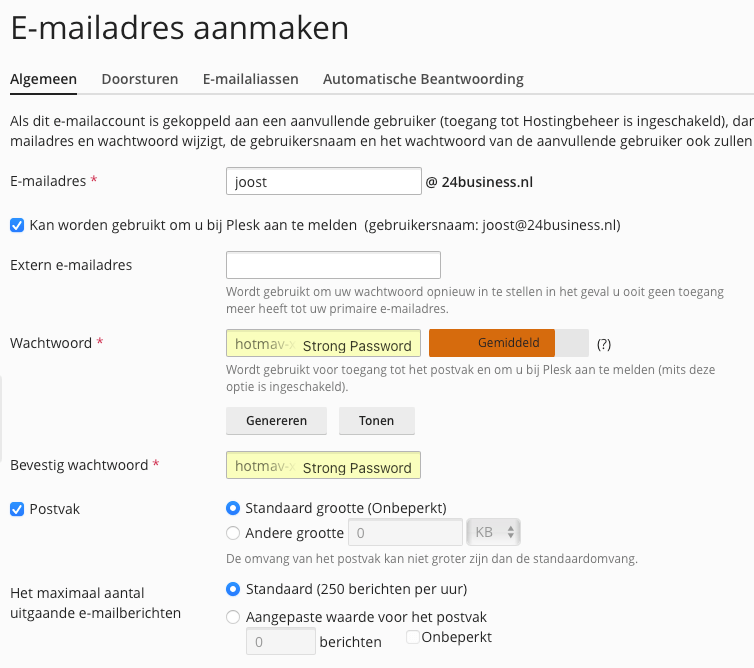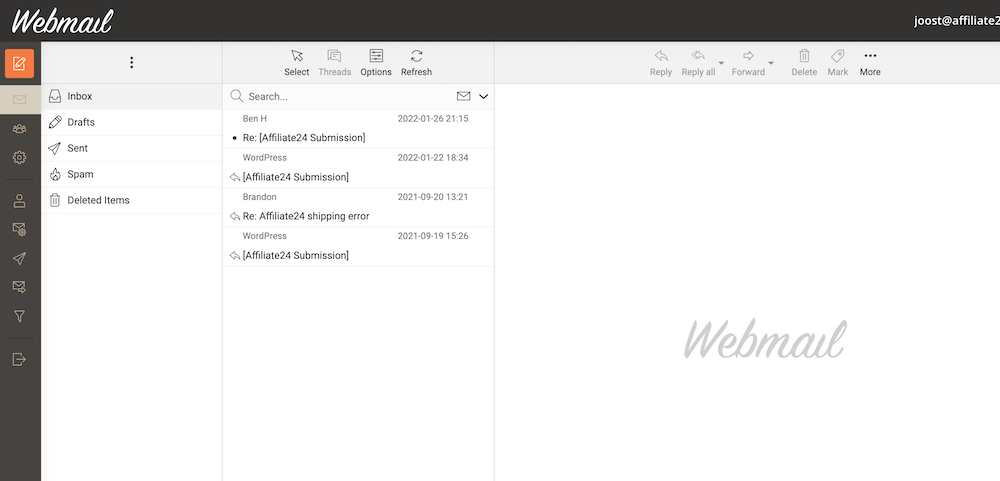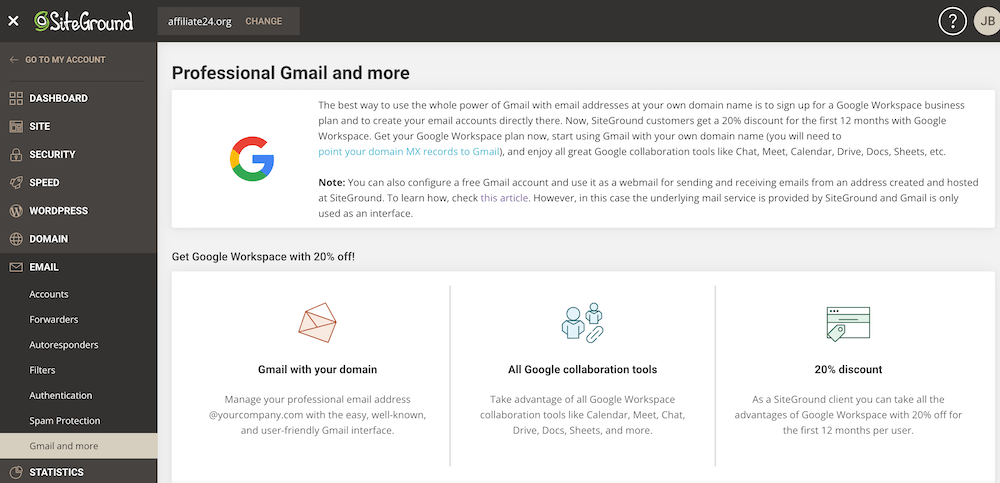The Best Email Hosting (2025)
Want to know the best email hosting service right now? With Cloud86, you can get 10 email addresses for just a few euros per month. Choose their Power plan (for just over ten euros monthly), and you'll get unlimited email addresses and 100GB of storage.
The best email hosting is fast, reliable, and offers dependable support that you can reach in no time.
Email hosting is linked to your website's domain name (name@yoursite.com) and can be set up within minutes. However, not all email hosting services are created equal. There are significant differences in the number of email boxes you can manage, the allocated disk space, and the maximum size of attachments you can upload.
In this overview, I separate the wheat from the chaff. I've tested and reviewed numerous hosting providers, allowing me to share from personal experience which hosting services are worth your time and which ones you should avoid.
The best email hosting of 2025
- Cloud86 – Best email hosting for more people
- Hostinger – Best affordable email hosting with 24/7 support
- SiteGround – Best customer service (24/7)
- NameHero – Fast hosting with rapid email
Cloud86 – Best email hosting for most people

Cloud86 is an independent hosting provider based in the Netherlands. They're known for their lightning-fast WordPress hosting, customer service that you can reach by phone without any wait time, and attractive features. These include automatic backups with all their plans, a staging/test environment, and a Plesk dashboard that works well for both beginners and experienced users.
In addition, they excel in email hosting. With their cheapest plan you already get 10 email addresses. If you upgrade to the next tier (which still only costs 6 euros per month), you'll get 50 email addresses. Their Webhosting Power plan offers 100 GB of storage and unlimited email addresses.
A nice bonus: all their email hosting plans come with spam and malware filters. Additionally, Cloud86 offers free migration options. If you already have your business email hosted elsewhere, their support experts can transfer it over for free.
Another appealing aspect of their email hosting is that you can personally configure how much storage space each inbox is allocated and how many outgoing emails can be sent from each address.

The provider is perfect for small business owners thanks to their personalized approach and excellent value for money. They're also ideal if you prefer doing business with companies that are easily reachable by phone (without frustrating wait times).
We at WebsiteGecko have been a satisfied customer of theirs for years.
Visit Cloud86 now or read our Cloud86 review for more details.
Hostinger – Best affordable email hosting with 24/7 support

Hostinger is an international provider with millions of customers. They are one of the largest hosting companies in the world. They're particularly known for their rock-bottom prices (compared to other international hosting providers) and fast servers. Additionally, they offer 24/7 customer support that you can reach via live chat or email tickets.
Hostinger's Premium Web Hosting plan offers 100 GB of storage and allows you to connect 100 email addresses. Additionally, each mailbox is allocated a separate 1 GB of disk space.
This easily makes Hostinger one of the most cost-effective email hosting providers on this list – especially if you plan to use dozens of email addresses.
Visit Hostinger now or read our Hostinger review for more details.
SiteGround – Best customer service (24/7)

SiteGround, like Hostinger, is a well-known international name in the hosting industry. Their server infrastructure runs on the Google Cloud Platform, giving you access to “Google's speed.” They offer excellent 24/7 customer service that's considered the best in the business (as a long-time user, I can confirm this). Additionally, their super user-friendly dashboard makes them extremely suitable for beginner webmasters.
With their cheapest plan, you get 10 GB of storage space and unlimited email addresses. Like most providers in this overview, they use Roundcube as their standard email client. However, you can also set up Gmail as your email interface with them.
SiteGround is more expensive than the other providers in this overview. However, they offer an extremely reliable, well-functioning service that's perfect for beginners and provides excellent performance for more demanding websites.
Visit SiteGround now or read our SiteGround review for more details.
NameHero – Fast hosting with rapid email service

NameHero is an international hosting provider you've probably never heard of. With 500,000 customers, however, you can hardly call them small. NameHero offers 24/7 customer service that rivals SiteGround's, uses LiteSpeed servers just like the top 3 providers in this overview, and provides hosting plans that cater to an incredibly wide range of websites.
With their most affordable plan, you can already use an unlimited number of email addresses and get unlimited disk space. Take “unlimited” with a grain of salt, though. At NameHero, the limiting factor is the number of inodes (files) you receive. Their cheapest hosting plan gives you 250,000 inodes. Opt for their higher-tier plans, and the limit increases to 500,000.
NameHero is the ideal provider if you don't mind working with a less well-known, international hosting company. However, their dashboard (cPanel) is less beginner-friendly than the custom dashboards offered by providers like SiteGround and Hostinger. That said, NameHero gives you extremely good value for money in terms of speed and server specifications.
Visit NameHero now or read our NameHero review for more details.
Comparing email hosting services
Below we'll examine how the cheapest email hosting plans from the providers in this overview compare to each other.
| Cloud86 | Hostinger | Mijn.host | SiteGround | NameHero | |
| Hosting plan | Web Hosting Starter | Premium | .starter | Startup | Starter Cloud |
| Starting from | $1.95/month | $2.99/month | $2.49 per month | $2.99/month | $2.69/month |
| Mailboxes | 10 | 100 | 50 | Unlimited | Unlimited |
| Disk space | 5 GB | 100 GB | 5 GB | 10 GB | Unlimited |
| Customer Service | Phone support available on weekdays | 24/7 live chat | Email support | 24/7 live chat and phone support | 24/7 live chat |
A quick note about NameHero's “unlimited” mailboxes. In the web hosting world, there's really no such thing as unlimited. While there might not be a hard limit on disk space, you do have an inode limit of 250,000. Simply put, inodes refer to the number of files stored on your server. For example, one email equals one file.
What to look for when choosing email hosting providers?
When selecting email hosting, consider the following points.
1. How much disk space do you get?
The disk space you get from different hosting providers and hosting plans can vary significantly. Keep in mind that your website can easily grow to several gigabytes in size. If you choose a starter plan with, say, 5GB of disk space, you won't have much left when multiple people are using email inboxes.
However, there's no need to panic if your disk space eventually fills up. Most hosting providers offer higher-tier plans for just a few extra euros per month that you can easily upgrade to.
2. How many email accounts do you get?
Even as a solopreneur, you'll often already need multiple mailboxes. Consider having an info@… email address alongside an email address with your name.
Fortunately, most entry-level plans from email hosting providers offer far more mailboxes than you'll ever need. For example, with Mijn.host's cheapest plan, you already get 50 mailboxes.
However, keep in mind that the number of mailboxes isn't the only limiting factor. Storage space matters too. So even if you get countless email mailboxes, make sure the storage capacity also meets your needs.
3. What email software is being used? Can you link the email hosting to Gmail or Outlook, for example?
The email software used by most email providers is an open source solution like Roundcube. While there's nothing inherently wrong with this, it offers significantly fewer features and capabilities compared to platforms like Gmail (via Google Workspace) or Outlook. This isn't necessarily a problem as long as email isn't a critical component of your business operations.

However, with many hosting providers, you can use Gmail or Outlook as a client interface for your email. You're essentially using a free Gmail account that you connect to your domain name. The whole system still runs on your hosting provider's server though. This also means that your emails are stored there.
SiteGround is an example of an email hosting provider where you can use Gmail as your interface.

4. Is customer support readily available for you?
Customer service is something you generally don't really think about. Until you need it.
For something as important as email hosting, you should expect customer service to have your back at all times. As you can see in the comparison table above, customer service varies quite a bit between providers. Some offer 24/7 support, others can be reached by phone, and some only provide live chat assistance.
By the way, the customer service quality is excellent across all providers in this overview. The question is which communication channels you want to have available.
Taking care of email hosting externally: when does this make sense?
As a small organization, you can save hundreds of euros per month by choosing email hosting. A dedicated service like Outlook typically costs at least 5 euros per month per user. When you're managing dozens of email addresses, these costs can really add up.
However, there are a few reasons to keep your email and web hosting separate from each other:
- Email can consume a significant amount of bandwidth and storage space. This may reduce the resources available for your website.
- If your hosting goes down, both your website and email will be inaccessible.
- When you decide that your web hosting provider isn't the right fit for you, you'll need to migrate not only your website but also your email. This will cost you extra time and create additional stress.
That's why many businesses choose to host their email separately. Although this costs extra money, depending on your situation, it may be a better solution than combining everything. You can read more about this in our article on setting up a business email.
If you want to keep your email separate from your web hosting, take a look at one of the following solutions.
Google Workspace

Google Workspace is the most well-known and popular business email service in the world. However, it's not just for email. You also get access to a complete suite of productivity tools (such as Google Sheets and Google Docs) and cloud storage.
Let's get back to the email aspect of Workspace. Of course, this is where Gmail comes in, a service that Google has now been running for a few decades.
Gmail has, in many ways, redefined what email can be. From color-coding to better organize your emails, an archive function, and handy shortcuts for lightning-fast inbox navigation: Gmail has rightfully evolved into the communication hub for many organizations.
Additionally, you can enhance Gmail with various external plugins. Take Boomerang, for example, a service that sends you reminders to follow up with people. Or one that lets you write emails now but schedule them to be sent later. This is extremely useful when you're focused on business development and want to automate your outreach as much as possible.
Depending on how much disk space you need, Google Workspace costs between 5 and 10 euros per month per user. This includes at least 30 GB of storage, which is more than enough in most cases.
I've been using Google Workspace for over 10 years across all my businesses and projects. Throughout that time, I've watched the service continuously improve and make my life easier.
I can't imagine moving my email (and other productivity necessities) elsewhere in the coming years.
Outlook

If you're reading this, chances are you once had a Hotmail account. Hotmail transformed into Outlook in 2011, which brought about a shift in focus toward business applications.
Hotmail has a far from spotless reputation (which is one of the reasons why Microsoft changed its name). With Outlook, however, Microsoft has worked hard to transform the service into a reliable business platform for hosting email. The service integrates perfectly with Microsoft 365, giving you easy access to all their productivity apps, just like with Google.
Outlook is the perfect email hosting choice if you prefer Microsoft products over Google products.
The costs of the two services are quite similar to each other.
Conclusion
Here are the top email hosting providers right now:
- Cloud86 – Best email hosting
- Hostinger – Best affordable international email hosting
- Mijn.host – Excellent value for money
- SiteGround – Best customer support (24/7)
- NameHero – Fast hosting with speedy email
For most people, Cloud86 is the best option. This provider offers plenty of mailboxes and storage space for very little money. Additionally, in my opinion, it's the best hosting provider in Europe.
Cloud86 isn't just ridiculously fast (thanks to their brand-new LiteSpeed servers), but they also offer phone customer support and provide numerous useful features (such as automatic daily backups and a test environment for your site).
However, keep in mind that in some cases it may be wise to separate your email hosting from your web hosting. For example, if you're a larger company that sends an enormous number of emails per day (all those emails consume bandwidth and storage space).
If this is the case, consider hosting your email with Google Workspace.

